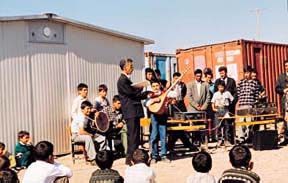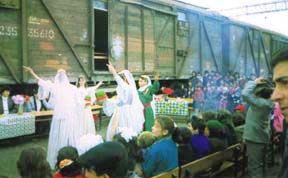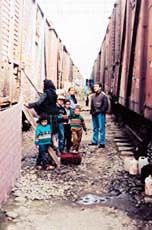|
Autumn 1998 (6.3) Boxcars,
Dugout Shelters and Promises to Keep by Elin Suleymanov
They say music is the soul of Azerbaijan. That's true - so true. Recently, I heard Agadadash Agayev, one of Azerbaijan's leading singers, sing a beautiful, but strikingly sad song which brought back such deep memories of the past year when I worked in Azerbaijan with the United Nations High Commissioner for Refugees (UNHCR). The lyrics of the song went: "My Motherland is wounded. My heart is bleeding. Don't ask me how my life is - I am a refugee." Anyone whose eyes are open can see that Azerbaijan is a country full of refugees. It's obvious everywhere - from the filthy public buildings in Baku and other urban centers to the tented camps of Sabirabad and Barda, the makeshift shelters of Beylagan, the railroad sidings at Saatli and the dugout homes at Agjabadi. Refugees are the great tragedy of our land. It's a problem that runs so deep that I don't think Azerbaijanis themselves fully comprehend the catastrophe. You'll find refugees living in practically every significant settlement in Azerbaijan. During his recent visit to Baku, Soren Petersen, Assistant High Commissioner of UNHCR, said that Azerbaijan has the highest percentage of displaced people in the world - about one out of every eight persons - nearly one million out of 7.5 million.
Life for the refugees who have settled into boxcars in Saatli. Elin Sulyemanov, author, looks on. Those boxcars, constructed of metal, are scorching hot in summers and brutally cold in winter. Besides, it's such an inconvenient location. Crude toilets, no showers, a place where every drop of water has to be hand carried in plastic containers from distant outdoor spigots. For some, it means bending under the bellies of boxcars along five separate sidings to bring the water to their impoverished homes. But the villagers of Marjanli are among the lucky ones. At least, they've been able to maintain some semblance of community. For so many others, exile has meant total separation from friends, family and relations. School in Boxcars In summer, classes are often held outside and the kids crawl under the boxcars in search of shade to escape the suffocating heat. Once, when a journalist asked Vasif if the kids studied English, he apologized, explaining that there weren't any English teachers among the refugees. However, some were studying French. The teachers are proud that many of their alumni are now enrolled in universities. The school has a children's choir, which is only to be expected, since Marjanli was a village in the Karabakh, the traditional heartland of Azerbaijan's music. I'll never forget listening to their choir sing the Azerbaijan national anthem. But I couldn't stop thinking of the irony of the situation. For seven years Azerbaijan has been independent. Seven years its people have had the right to sing their own national hymn. But for those kids, five out of those seven years have been spent living as refugees. These are fine kids - smart and serious. Azad, 14, wants to become a doctor. My favorite, the beautiful, blue-eyed Fayila, has decided she wants to be a journalist after she met some international reporters that I brought along once. And two little girls, both named Gunay (a name which means "Sun-Moon") are always giggling and laughing all the time. The two Gunays were born in the boxcars. They have known no other home. They're smaller than average for children their age, but that's not unusual for refugee kids. Nearly every child in Azerbaijan's refugee settlements suffers from serious malnutrition as a result of their far-from-adequate diet, which consists primarily of bread and weak tea. I remember how the kids used to crowd around when we would drive up in the UNHCR vehicles. They would beg us, "When are you going to help us go back home?" What answer could I give them? How could I look them straight in the eye and give them an honest answer? How could I give them hope, not just empty promises? "Refugeestan" Other memories of this past year come flooding over my mind. In one of the settlements not far from Barda, there's an old lady who steps out of her home every evening at sunset and faces the mountains to the west. These are the mountains of Karabakh - her home. "They're so close and, yet, so unreachable. I still cannot go home," she says. "I'm old. I don't want to die here. The time will come when I must. But I'd rather walk there and be killed by those who are occupying my land." Barda itself is a city overwhelmed by a refugee population. The notorious "ex-Turkish tent camp," which houses nearly 8,000 people, is only a few kilometers away. Everyone refers to it as the "ex-Turkish camp" because it used to be maintained by the Turkish Red Crescent until they suddenly left in 1996. Today, it's a very sad place - a dreary mixture of terrible living conditions and horrifying psychological pressures. Lachin Wintergrounds Since 1992, thousands of Lachin residents have been living in underground dugouts previously used to shelter animals, having fled from Lachin. Their tiny town now has become the geographical link between Karabakh and Armenia. These days a new road connects the two. Only Armenians live there now. I so clearly remember Rashid, who used to work as a driver in Lachin. He would smile when he saw me arriving with yet another group of journalists. "Don't ask him for assistance, he would remind his neighbors who had gathered around. "He's only here to talk. He works with journalists, not with aid." When I tried to explain that it was important to acquaint the world with the plight of the refugees, Rashid would smile and reply that he had been talking to people for years, but still nothing had happened. "Where's the Old Man?" I asked, trying to change the subject. "Just like always, wandering around outside," Rashid told me. The Old Man is a 96-year old shepherd and veteran of World War II. Every time I see him, no matter what season, he's always wearing a fur hat and a jacket decorated with all his war medals. I found him walking around in circles, saying over and over to himself, "Human beings cannot live without water." He was referring to the fact that the entire supply of water for the settlement has to be carried in on the backs of the thin, weary-worn, pack animals. Each family has to take responsibility for getting its own supply-every drop of it. The closest source is five kilometers away. It's the same thing every day, load up the animals with those heavy metal containers and make the slow trudge across the plains for the water, hoping that the animals won't collapse before you return. Most of the water ends up being consumed, not by humans, but by the animals. But what can they do? They depend on those animals for their own survival. Once a journalist told the Old Man that she had been to the other side (meaning Armenia), and visited Lachin before coming to Azerbaijan. "Lachin is where the Lachins are," he replied. "The people of Lachin are here and this dusty desert is what Lachin is today." "But why?" At 96, the Old Man still looks healthy. In fact, he's much healthier than either his son or his grandson. Neither one of them is likely to reach the age of the Old Man - this Old Man who has spent most of his life breathing the fresh mountain air of Lachin. I remember walking back to Rashid's dugout. Inside, tacked onto the dried mud walls are pictures of waterfalls in Lachin. It's the only reminder of the beauty of the place where he spent most of his lifetime, growing up. We chatted and Rashid explained his very informed vision of world affairs. He complained about Section 907 of the Freedom Support Act that the U.S. Congress passed in 1992 which denies all U.S. aid to the Azerbaijan government. In fact, in every refugee settlement, people always ask about the developments of the "907." They know President Clinton is against it. They know that Congress must decide on it. They even know when it is being discussed in Congress. The only thing they can't understand is how it managed to get passed in the first place, and why nothing has been done to repeal it. "They call us 'aggressors,' but we are merely refugees. It was our land, not the aggressors, that was taken away. What kind of law is that?" Rashid groaned. An American journalist interrupted him: "But the abolition of the '907' would not necessarily mean you would receive more aid." With his gentle smile, Rashid turned to me and said, "But that's not the point. After my entire family has been forced off our lands and made to live in a dugout for six years, the very least we can expect is for this fact to be recognized. But instead, the Americans blame us for the war. The worst part of '907' is that the country we placed our trust in has added insult to our injury - our excruciatingly painful injury." But there's really more than insult when it comes to "907." This law, which even the American Ambassador to Azerbaijan Stanley Escudero has called "an outrageous piece of legislation," has caused long-term damage to Azerbaijan. Personally, it's hard for me to believe that the Congressional representatives who passed it fully understood its implications. The embargo imposed on Azerbaijan is so illogical that it had to be a mistake. Consider the fact that Azerbaijan is a pro-Western, post-Soviet state that has had to cope with hundreds of thousands of refugees, while nearly 20 percent of its territory is occupied by Armenia, and while it is under severe pressure from neighboring Iran and Russia. Defenders of "907" say that modifications have been made to the law so that some humanitarian aid can now trickle through to Azerbaijan. Technically, that may be true but the process is so cumbersome and circuitous. U.S. aid becomes extremely inefficient and costly, meaning so little of it actually benefits the refugees. By not allowing assistance to governmental institutions, U.S. aid is denied to medical facilities and schools. Refugee children do not get adequate care at the decaying post-Soviet public health care facilities. They have missed out on years of education. Bright students from Azerbaijan have been denied the opportunity to participate in exchange programs, and young people from the U.S. have been prevented from coming to Azerbaijan through programs such as the Peace Corps. Some U.S. aid manages to get directed to NGOs, or non-governmental organizations. Such developmental aid is critical for the future of civil society in Azerbaijan. But even more imperative is the need to reform state and governmental structures. NGOs help to complement the activities of the government, but they don't replace them. U.S. aid to Azerbaijan through NGOs results in setting up parallel systems that are fully dependent on outside assistance and very limited in scope, and consequently, only temporary in nature. One may ask why the U.S. should help Azerbaijan anyway? It's a legitimate question. But consider that Armenia, in spite of its occupation of Azerbaijan's territory, is among the top recipients of the world when it comes to per capita receipt of U.S. foreign aid. In the six years since the passage of the Freedom Support Act to assist the former Soviet republics, more than $1 billion has been channeled into projects in Armenia which has a population of 3.5 million. Azerbaijan's population is at least twice that of Armenia's and suffers from the huge burden of nearly a million refugees. Besides, why should Azerbaijan be the only country in the former Soviet Union to suffer from U.S. sanctions? Azerbaijan's survival as an independent nation is crucial for stable development throughout the entire region, Another question frequently asked is, "Why doesn't Azerbaijan's government do more for its own people?" Azerbaijan's state structures may lack efficiency, but the government and the country do what they can to help the refugees. The displaced population in Azerbaijan benefits from state utilities provided free as well as social services and structures, including schools and retirement benefits (meager as they may be), despite the fact that they do not contribute to the state budget. Moreover, Azerbaijan has been overwhelmed by waves of displacement beginning with 50,000 Meskheti Turk refugees who fled Uzbekistan in 1990 and who Azerbaijan welcomed, despite the fact that Georgia was their homeland before Stalin exiled them to Central Asia 50 years ago. Some Refugees are Returning Despite its relatively short military occupation, the Armenian forces managed to cause serious damage to the houses and to burn down the school. Houses in the village are being rebuilt with help from a U.S.-based and UNHCR-funded organization, the International Rescue Committee. Today this effort continues in Fuzuli on a much larger scale with the support of oil companies like UNOCAL. Directly across the road from the newly rebuilt school lives a woman whose husband died while helping friends escape the attack on their village. He collapsed from a heart attack when his house was hit by a shell. This was the house that he had spent his entire lifetime building. Today his wife and three teenage daughters are living in a single room that has been rebuilt inside the shell of their house. "I will never be a refugee again," the woman declared, "and I will never leave my home, even if it means dying here." She says this despite the fact that there are no jobs, no telephones, and almost everything has been destroyed. "This is home. Do you know how good it is to be back home? Life is tough, but I am happy here." At every stop, refugees begged me to spread the truth about their situation, hoping, perhaps naively, that if their story were only known it would help them return home. And so I promised Rashid, the Old Man, the principal Vasif, and the kids in the train cars that I would let people know about them. I also promised to try to get more support for the schools and to help 14-year old Azad enter medical school. One promise will be kept for sure: I will never forget the lessons learned from these courageous and enduring people. In spite of living in horrifying conditions of exile for years, their hearts are open, and they have never lost their dignity or their hope. Elin Suleymanov worked as
Public Information Office at UNHCR for the past year in Baku
and has now been assigned as Second Secretary / Press-Officer
at the Azerbaijan Embassy in Washington, D.C. He can be contacted
at <azerbaijan@tidalwave.net>. Back to Index
AI 6.3 (Autumn 1998) |
||||



